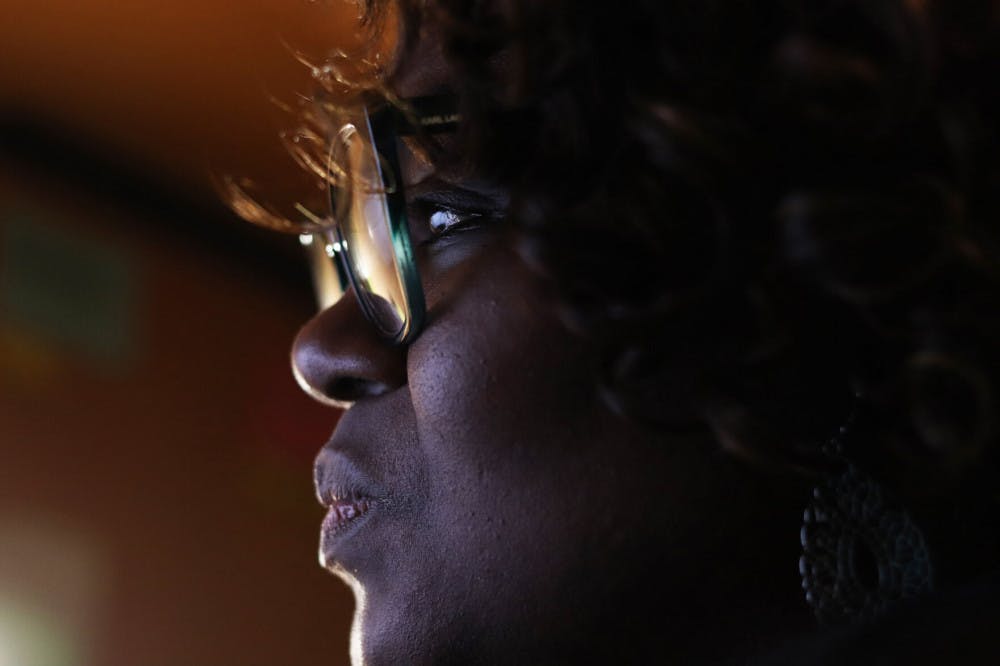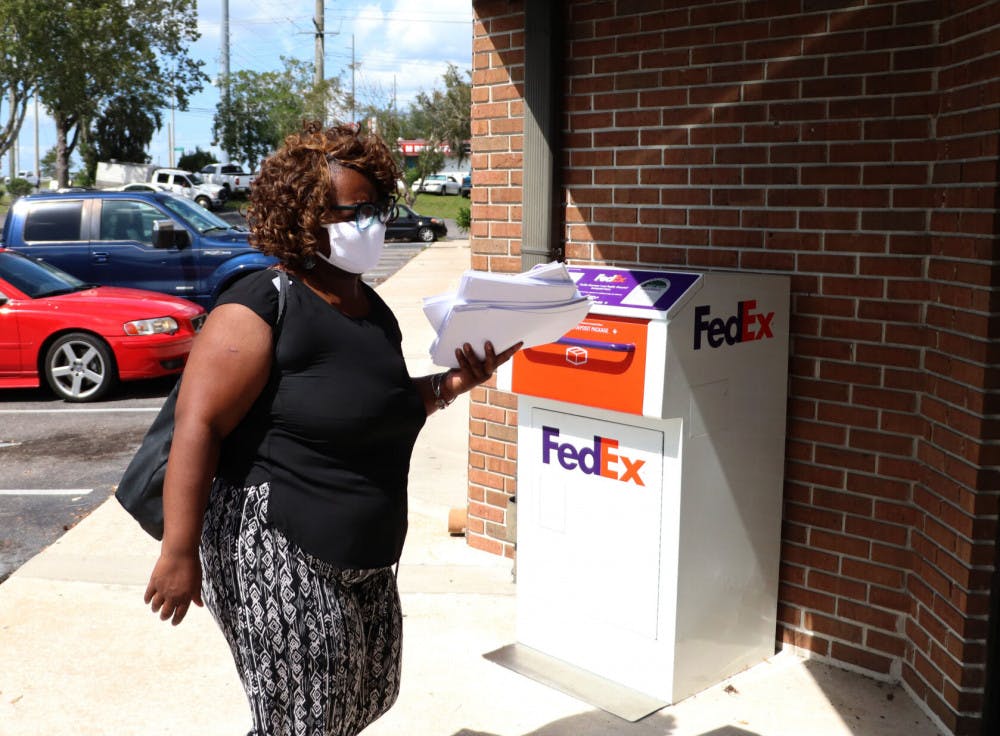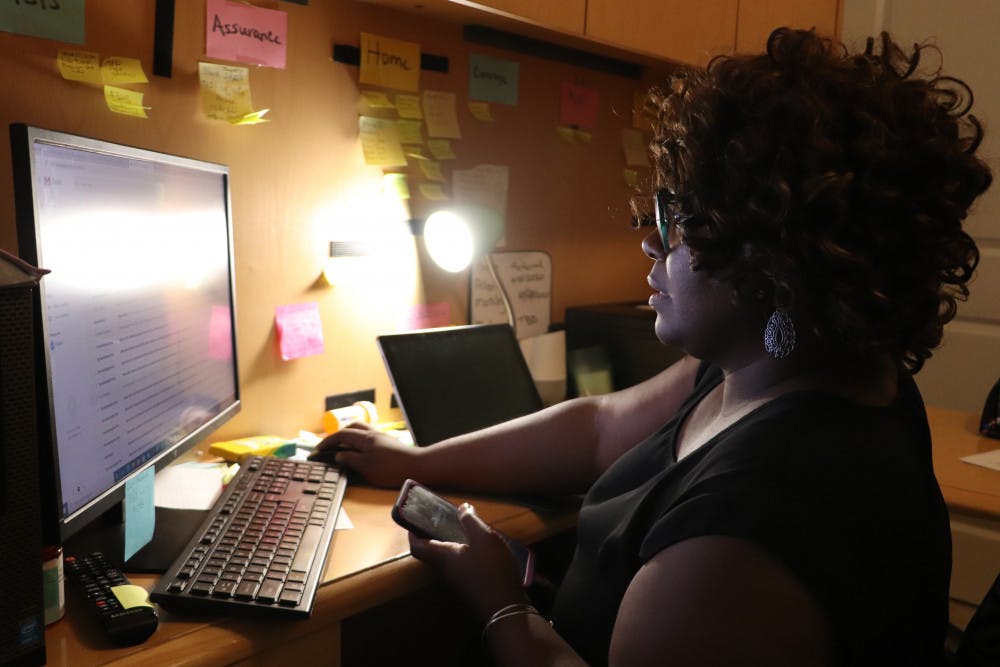Sometimes Chanae Jackson feels like the weight of the world rests on her shoulders.
Jackson juggles her role as a community organizer with being a self-employed mother of three and a godmother of two. She hosts a discussion-based talk show called “LOUDD” Conversations, which streams on Facebook Live every Wednesday. The talk show’s mission is to inform and empower its listeners by discussing political, cultural and social issues.
Following the death of George Floyd, an unarmed Black man killed by a now-fired police officer in Minneapolis, protests spread across the U.S., sparking a national outcry on systemic racism. It was an emotionally draining time for Black Americans and their mental health.
Now, Gainesville’s Black residents say there’s a need for more Black therapists.
Through “LOUDD” Conversations, Jackson said she hopes to create a space for members of East Gainesville’s community to discuss Black and African American issues on a local and national scale. Jackson and her three co-hosts, Ty Loudd, Keyon Young, and Nate Turner, tackle topics ranging from cultural appropriation to developments on the nationwide Black Lives Matter movement.
In early September, Jackson and her co-hosts dedicated an episode to mental health within Black communities because the hosts themselves felt mentally drained, Jackson said. In the episode titled “Black Trauma Matters,” the four hosts discuss PTSD, what they called post-traumatic slave disorder and how society perceives Black Americans as being able to sustain more pain and grief.
“We live in a society where, as a Black person, you can’t weep,” Jackson said.
To Jackson, Black counselors and mental health professionals can offer insight into mental health and race.
Jackson struggled to find a Gainesville therapist for her daughter. She said she wanted someone who would be patient and empathetic with her fifth grader, who needed help with anger management. So, she looked for a Black counselor.
“He was able to understand that the manner in which you communicate with her is different because she's a Black little girl and her communication style is different,” Jackson said of the counselor. “She’s had other counseling that was helpful but not nearly as effective as it was with that Black counselor.”

Chanae Jackson searches for a land surveyor online at her home office in Ocala, Fla., on Thursday, Sept. 24, 2020. Jackson is self-employed, has five different businesses and is setting up a website for her community work called "The Accidental Activist." She said being self-employed helps keep other people from silencing her voice.
Amanda Taylor, a 31-year-old licensed mental health counselor and life coach, is passionate about uplifting other Black therapists. A resident of Northwest Gainesville, Taylor features local Black-owned businesses on her professional website and hopes to begin a list of Black therapists soon.
She said her peers face obstacles when attempting to become licensed therapists — even years after obtaining their undergraduate degrees. The largest one is the $300 fee to get licensed, she said.
“A lot of us don’t have the opportunities or resources that people of other ethnicities may have,” Taylor said. “It’s a barrier within our culture.”
She said she remembers feeling undervalued at a former job, which would only hire her as a master’s level clinician. Taylor needed to accumulate 1,500 hours of supervised experience before she could apply for and take her licensing exam. Supervisors were scarce and Taylor had to search elsewhere.
During that time, Taylor was unable to afford housing, and later, the fees to take her exam, which would allow her to apply for a higher-paying job.
“My whole process has been filled with a lot of obstacles,” she said. “I’ve been homeless. I’ve been in jail. I’ve faced a lot of adversity, a lot of judgment.”
It’s difficult for Black patients to receive the mental health help they need, Taylor said. Many have trouble navigating Medicaid and knowing what facilities or private practices may accept them.
Mei Lavaud, a 20-year-old UF sociology sophomore, began her search for a therapist in May 2019. Her efforts to find one, both at UF and throughout Gainesville, were unsuccessful.
Lavaud faced the obstacle of finding practices that would accept her insurance, take new patients, or even just answer her phone calls. Most of the available therapists were white men, she said.
“I knew that wouldn't really be helpful to me because I know how Black people are usually perceived,” she said. “When it comes to therapy, they will diagnose you with having anger issues or an attitude problem before they actually diagnose you with something serious.”
Her search ended nine months later, five hours away in her hometown of Fort Lauderdale. Every two weeks, she’d drive south to see her Afro-Latina therapist.

Chanae Jackson enters FedEx to mail refinancing documents in Ocala, Fla., on Thursday, Sept. 24, 2020. Her responsibilities as a self-employed woman include mailing paperwork, answering phone calls, training and keeping up with certifications and billing.
Lavaud’s family moved to the U.S. from Haiti when she was 3 years old, and she said she identifies as Afro-Caribbean. Almost two decades later, she remembers her mother’s words upon their arrival.
“The first thing my mom did was sit down and say ‘You’re Black, so you have to act a certain way, to be accepted,’” Lavaud said. “That was something that I've had to carry with me my whole life.”
Lavaud said she pressured herself throughout her studies, often overexerting herself, to prove that she could succeed at the same rigor as her white peers at UF. Earlier this year, the publicized deaths of black lives added to her anxiety, such as George Floyd and, later, Breonna Taylor, who was fatally shot in her sleep by four police officers in Louisville, Kentucky.
“It was this never-ending cycle of seeing more Black people dying,” she said. “Every time you log onto social media, it’s another hashtag. Another face. Another story.”
To Lavaud, Black communities should seek mental health counseling because many often turn to prayer and religious leaders. The Black community should disconnect from social media and lean on one another for support, she said.
“Things are starting to change, but still needs a whole lot of work,” Lavaud said. “We need more Black therapists.”
Chanae Jackson checks her email while talking on the phone in Ocala, Fla., on Thursday, Sept. 24, 2020. She said she spends about seven hours a day on the phone talking with clients, paying bills, following-up for her community work and client services, marketing her businesses and making personal phone calls.






